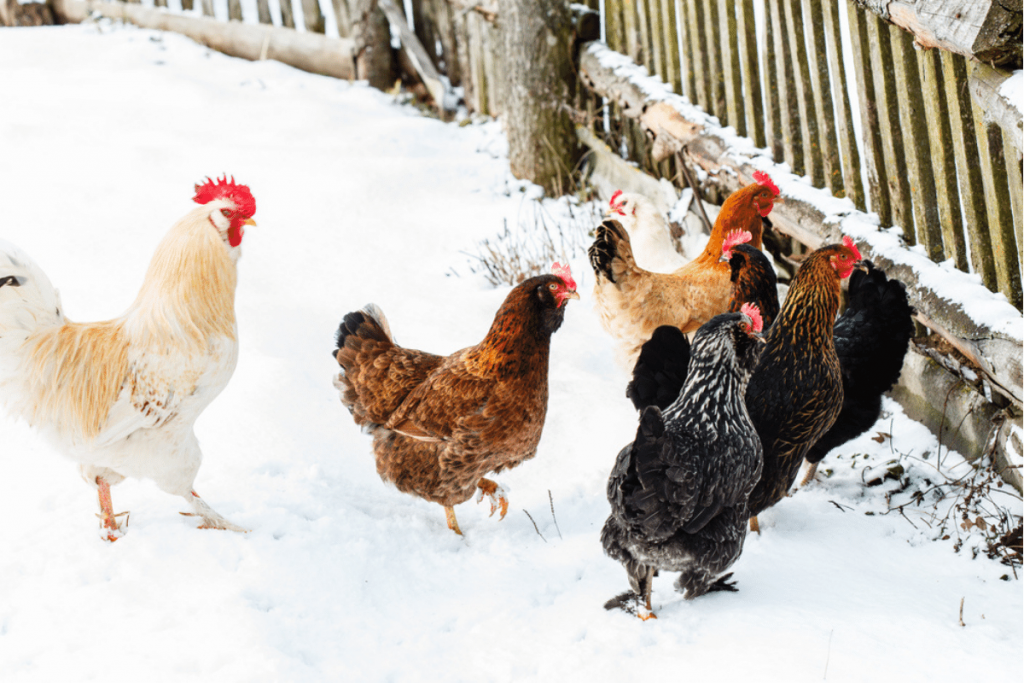Chickens are surprisingly hardy birds.
In winter, chicken owners may find themselves with abundant snow, and freezing temperatures impact your water supply.
Is snow a good alternative as a source of water intake to help with the battle of keeping water sources ice-free?
Chickens can and will eat snow, and some may even prefer it to other water sources you put out. To get the water they need, however, they must eat a lot of snow, which drops their body temperature and lowers egg production. Always provide liquid, fresh water all-year-round.
Read on to discover more about how chickens can use snow for water and other useful information for maintaining a healthy, hydrated, thriving flock in the winter.

Table of Contents
ToggleThe Truth About Chickens and Snow
Snow gives your chickens a new source of entertainment and a dose of hydration.
It means you don’t need to water as much, right?
Well, they still require a lot of snow to get the amount of liquid water they need daily.
However, even if you provide access to water dishes, they may ignore it in favor of snow.
Snow gives them entertainment, in addition to hydration.
Related Reading: What happens when chickens dehydrate
They peck at everything; this is a source of fun and water for them.
But the water in their feathers and drinking the cold snow lowers their body temperature.
To dry off, keep your chickens warm with a well-ventilated chicken coop in winter.
This helps control their body temp and helps keep them dry.
If the moisture is allowed to stay on their bodies and the temperature in the box dips to freezing or below, then it will freeze on their bodies and wings.
Will Chickens Eat Snow if Their Water Sources Freeze?
They will get the water they need from snow, and, in some cases, you may see them eating snow even if they have a source of fresh drinking water available.
Wild birds eat snow for their water requirements when there are no sources of unfrozen water bowls available, and it is instinctual for chickens to do the same.
In older days, farmers left their chickens out to forage; their only fresh water source was snow.
However, it takes a lot of snow to make a cup of water; getting the water they need from snow alone will drop their core temperature.
It takes a lot of energy to keep their core temperature up, so if you are raising hens for eggs, this could contribute to the drop in egg production you may be seeing.
Should Chickens Eat Snow for Water?
As mentioned, it takes a lot of snow for a chicken to get its needed daily amount of water.
This can lead to other issues for you and your chickens.
Icy cold going into their system leads to a decrease in their core body temperature.
They may also not be getting enough water daily from the snow alone.
If you rely on those chickens for eggs, you’ll likely notice a decrease or stop in egg production.
The more snow a chicken eats, the lower its core body temperature.
This is a dangerous situation if the chicken cannot regulate its temperature.
If they produce eggs, then the energy goes into the egg’s production, not regulating their body temperature.
If you want your hens to keep producing eggs, warm water sources may help them keep their energy for egg production, as cold water or snow may cause them to expend too much on maintaining a steady core temperature.
How to Keep Water Sources from Freezing
Whether your chickens refuse to go in the snow or you think they’re not getting enough water, you need to provide them with liquid water at all times.
Sure, this will require more work on your part, but in the winter, chickens do need extra attention to ensure they are healthy.
If you haven’t already, running electricity to their coop is a great way to combat winter woes.
It provides a way to power things like heating lamps and electric water heaters or heated waterers, which keep water dishes from freezing and allows you to provide warm water for your flock more easily.
Check out this water heater on Amazon for a cheap yet effective option.
If you are counting on egg production, this may be the easiest way to provide warm water to keep their energy focused on eggs.
If you don’t have electricity in your coop, a simple way to prevent water from freezing is to go out several times and break the ice up.
While this is more time-consuming and more work for you, it may provide more enrichment for your flock.
They may like pecking at the ice chunks.
The type of water tub you use may also make a difference.
As the color black naturally absorbs more heat from the sun, and the rubber makes for an excellent insulator, black rubber tubs freeze slower than other materials.
Sit the tubs in a sunny spot, and the black rubber of the tub will absorb and soak up the light from the sun.
Other black rubber items will provide insulation and keep the dishes warmer for longer if you need extra insulation for the colder days and nights.
A larger tub would make a difference as well.
As larger tubs have more surface area, they take longer to freeze, giving you and your flock of chickens more time.
If you prefer not to have to break through the ice or have a very thick layer of ice, pouring boiling water on the ice will melt it.
You must mix it well with the colder water so the chickens are not burned on boiling surface water.
How useful was this post?
Click on a star to rate it!
We are sorry that this post was not useful for you!
Let us improve this post!
Tell us how we can improve this post?
